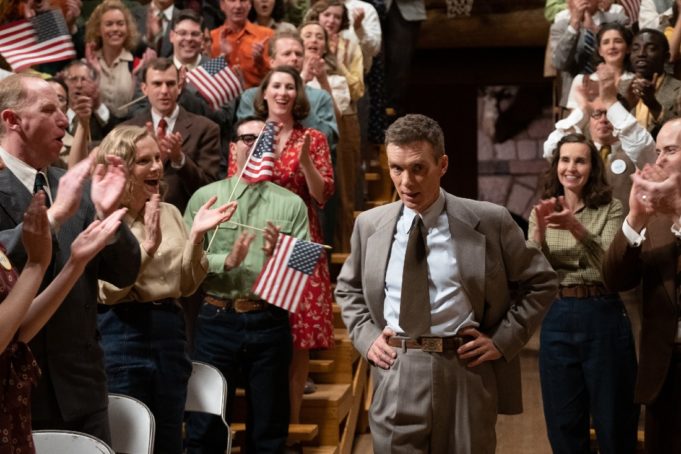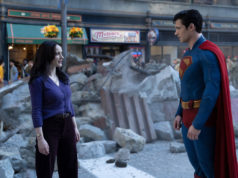Why do we watch a three-hour historical epic? We do it to be swallowed up. Other types of movies can make us see how a historical figure’s personal problems and dilemmas might be the same as ours. A big blockbuster like Oppenheimer seeks to plunge us into the very atmosphere of another time so that we can taste the air, listen to the music, feel the joys and fears of that period.
Christopher Nolan certainly has the ability to make us do all those things. It’s not easy to evoke a single mood over the course of an entire 180-minute opus. It’s even harder when that mood is one of guilt-wracked despair, and darned if Nolan doesn’t almost pull it off. This movie has much that’s impressive, and yet I can’t shake off a feeling of failure while watching this.
The core of the story adapted from Kai Bird and Martin Sherwin’s Pulitzer-winning biography American Prometheus: The Triumph and Tragedy of J. Robert Oppenheimer is the familiar tale of how mercurial physics genius J. Robert Oppenheimer (Cillian Murphy) takes charge of the Manhattan Project, builds a town out of nothing near his beloved vacation spot of Los Alamos, N.M. to house the country’s most brilliant scientists, and develops the atomic bomb that ends World War II.
Around this core are two interlocking framing stories: One is at a closed hearing in 1954 when the acclaimed scientist seeks to renew his security clearance. A commission that’s clearly out to get “Oppy” hears testimony about his long-ago connections with the Communist Party. The other is at a public hearing, as Navy Rear Admiral and former Atomic Energy Commission chair Lewis Strauss (Robert Downey Jr.) seeks to become America’s Commerce Secretary. A U.S. Senate committee that’s supposed to rubber-stamp his confirmation instead grills him about his affiliations with Oppenheimer.
From the start, Nolan gives us precious few opportunities to catch our breath. The film toggles between timelines as Oppenheimer himself and various colleagues, friends, and enemies look back on the past dozen years or so. Oppy’s academic career comes with big panoramas of the skylines of university towns: Göttingen, Leiden, Princeton, Berkeley. No sooner does he marry Jean Tatlock (Florence Pugh) than their marriage is falling apart and he’s cheating on her with equally unhappily married Kitty Puening (Emily Blunt). Not much lyricism and even less humor intrudes on the unhurried but relentless drive of the narrative. The film’s conventional narrative is accompanied by expressionist touches, like Oppy being stripped naked in front of the committee while admitting to his numerous extramarital affairs. These don’t work.
A ton of recognizable faces fill the screen — Matt Damon, Kenneth Branagh, Jason Clarke, David Krumholtz, Tony Goldwyn, Alex Wolff, Dane DeHaan, David Dastmalchian, Alden Ehrenreich, Matthew Modine, Casey Affleck — yet few of them are given much to play. Josh Hartnett is cast effectively against type as a physics professor and Benny Safdie pilfers his scenes as Edward Teller, the diva physicist who applies sunscreen to his face before watching the A-bomb test. Then again, Rami Malek turns up as a low-level factotum who blows up the bad guys’ plans to destroy Oppy’s reputation, and he’s exactly the wrong actor to cast as someone whom everybody else ignores. I wish Murphy’s performance were strong enough to pull all these personalities into orbit around him, but this worthy Irish character actor misses Oppenheimer’s charisma that seduces even his enemies.
We’re well past the two-hour mark when Nolan finally starts telling us what he’s going on about. The two framing stories dovetail in a way that’s marvelous and more than a bit oppressive. Various characters debate whether Oppy’s guilt over causing so many deaths in Japan is sincere or performative, and Nolan shows us that it’s both. When Nolan deigns to put his mind to a thrilling set piece — namely the testing of the A-bomb, with the scientists seeing the pillar of fire several seconds before the sound of the explosion washes over them — it comes off splendidly. It’s one of the movie’s surfeit of climaxes, as is a beautiful speech when Albert Einstein (Tom Conti) tells Oppy that one day the scientific community will shower him with honors as a way of absolving themselves for betraying him, just as Oppy once did to Einstein.
This is the story of a scientist who’s destroyed for being a peace advocate at a time when America’s power structure is drunk on building more nukes than the Soviets. The problem is, it could have been told better at two-thirds or maybe even half the length. The actual building of the bomb generates considerably less drama than you’d expect, and it could have been lost. Just the two framing stories would have sufficed on their own as a political thriller whose protagonist just happens to be the father of the Bomb. There’s a better, smaller movie inside Oppenheimer. It just got swallowed up.
Oppenheimer
Starring Cillian Murphy. Written and directed by Christopher Nolan, based on Kai Bird and Martin Sherwin’s book. Rated R.













He was lying card-carrying communist who was no peacenik. He was FOR the United States being disarmed, never the Soviet Union. He was FOR striking Japan when his colleagues wanted a demonstration to the enemy. Why? Because Stalin had a million-man army in Manchuria wanting to take Japan and turn it into another North Korea. He didn’t lose his security clearance because of military warmongers, but because Edward Teller said he was not to be trusted, as did his former boss at Berkeley. Hollywood hagiography. Looks about as flat, lifeless, and boring as his “epic” “Dunkirk.” Robert Downey Jr as Harry Truman? Good God, just on that alone… steer clear.